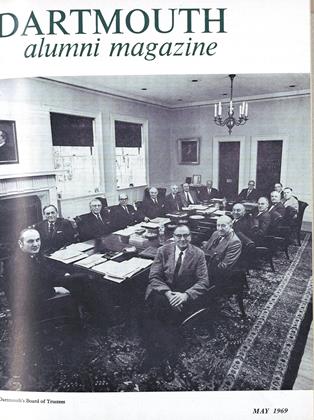ByPeter Day '35. New York: The SeaburyPress, 1969. 192 pp. Paperback. $2.95.
Five hundred years ago the Christian Church was torn apart by revolution. The movement was given the name "The Reformation." Today a new revolution is gaining force, and Dr. Peter Day's fine primer, Tomorrow's Church, explains how the current revolution is a determined effort to rebuild the structure torn apart by schisms of the past five or six centuries. He reports on what can be expected in tomorrow's church and on the complex problems that must be resolved in re-uniting Christendom. So, the movement being one of a bringing-together, it is referred to as the "Ecumenical Movement."
The author sets his premise by asking, "why discuss unification?" In careful, workmanlike manner he answers his own question. "The task is not so much to unite churches as to unite mankind in the Body of Christ." In Tomorrow's Church, Peter Day shows himself to be the well-informed, articulate, professional ecumenist which he is, as the Ecumenical Officer of the Episcopal Church (in the United States), and he still deals with the problems of the ultimate, unified tomorrow's Church in honest objectivity.
The book points out the need for a process of growing together before any form of unification can take place. Some problems are the wide variations amongst denominations in the methods of, and emphasis upon, ordination to the ministry; the ministry of the laity; and the acceptance of the fact that twentieth-century man has acquired radically new possibilities both for good and for evil. The building of tomorrow's Church must accordingly be concerned with all these new and often conflicting dimensions thus imposed by the basic commandment: to love one's neighbor as oneself.
The "crystal-ball questions" the author poses include how to untangle and resolve traditions of the past that these consultants on church unity must remember and cherish. He emphasizes that whatever is accomplished toward unification, tomorrow's Christian must be permitted to testify to his own faith, joyfully, without restraint or rancor.
All in all, for anyone who has a personal interest in, or concern for, the direction toward which Christianity is moving, or for one who may be confused, I should recommend Tomorrow's Church: The majority of the major Christian denominations, with many others, are participating either as consultants or as observers in this twentieth-century "revolution" and, as the book makes obvious, progress is being made.
After four years in banking and twenty ininsurance, Bishop Gilson entered the RedCross, served in the Philippines and Japan,became Treasurer of Episcopal Missions inChina, and as priest and bishop revitalizedTaiwan, where Mrs. Gilson was "MissionaryWithout Portfolio."
 View Full Issue
View Full Issue
More From This Issue
-
 Feature
FeatureMutual Sensitivity Wins the Day
May 1969 By JOHN DICKEY -
 Feature
FeatureWebster and the Court
May 1969 By THE HONORABLE EARL WARREN -
 Feature
FeatureWarner's 41 Dramatic Years
May 1969 By MARGARET BECK McCALLUM -
 Feature
FeatureMay 17 Event to Salute Eleazar's Starting Point
May 1969 -
 Books
BooksERNEST HEMINGWAY: A LIFE STORY
May 1969 By JEFFREY HART '51 -
 Article
ArticleThe Undergraduate Chair
May 1969 By CHRIS KERN '69
CHARLES P. GILSON '21
Books
-
 Books
BooksAn Overlooked Early Collection From the Rocky Mountains
May 1936 -
 Books
BooksNEW PLANS FOR OLD TOWNS
April 1943 By Albert S. Carlson -
 Books
BooksAN INTRODUCTION TO THE SOCIAL SCIENCES
October 1941 By Harry L. Purdy -
 Books
BooksFIRSTHAND REPORT: The Story of the Eisenhower Administration.
October 1961 By LANE DWINELL '28 -
 Books
BooksSOCIAL PROBLEMS
December 1950 By ROBERT GUTMAN -
 Books
BooksALGEBRA
MARCH 1967 By WILLIAM R. COGSWELL '61


